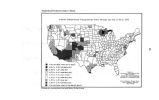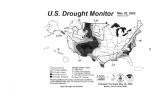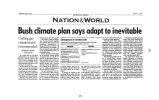| OCR Text |
Show 7 Salt Lake City when the winter snow is gone- sooner than anyone is comfortable with. I also want to thank my colleague- Congressman Chris Cannon- for agreeing to chair this hearing. Drought is not a partisan issue and the entire Utah delegation works together to raise awareness about the conditions we face in the West. I also would like to thank our witnesses. We have world- class experts on weather prediction and drought planning right here in Utah. Home- grown doesn't preclude world- renowned. Dr. Hayes, from Nebraska, is our one visitor and he comes with a distinguished record of work on drought risk mitigation planning. We should do more- through the information gathered today- than just try to mitigate drought. Science can help use understand the terms sent out by an arid land. But it is up to us to bring human innovation and technology to the challenge of living- and growing- within this desert environment. Mr. MATHESON. Mr. Chairman, I would ask for unanimous consent that the record of this hearing be held open for 14 days to enable those who are unable to testify or attend today to submit written materials to the record if they would like to do so. Mr. CANNON. Without objection, so ordered. Thank you, Mr. Matheson. Panel I We would like to now turn to our first panel of witnesses. First of all, Mark Eubank, as is well known by everyone in this audience, is the Chief Meteorologist for KSL Television, an NBC affiliate, here in Salt Lake City, Utah. Mr. Eubank has been doing television broadcasts in the Salt Lake area- I don't believe this, Mark, for over 36 years. That dates us both. I am a little worried about that. But a great 36 years. He also owned and operated WeatherBank, Inc., a weather- consulting firm for 20 years. Mr. Eubank is past President of the Utah Chapter of the American Meteorological Society, and has been an advisor for the State of Utah Weather Bureau Weather Modification Board. He was also Chief Meteorologist for the Salt Lake 2002 Winter Olympics as well. Dr. Thomas D. Potter is the Director of NOAA Cooperative Institute for Regional Prediction and a professor of meteorology. The Institute is located at the University of Utah. Dr. Potter has served as its director since 1998. Prior to becoming the Director of the Institute, Dr. Potter was the Director for the Western Region office of the National Weather Service in Salt Lake City. He also served as Director of two organizations within the World Meteorological Organization: the World Weather Watch, and the World Climate Program. Dr. Potter will discuss the definition of drought and produce some long- term climate records during the drought cycles that affect possible extremes in climate. Because droughts result in cumulative extended days without precipitation, precise determination of the beginning and ending of drought is difficult to define and so we look to our expert witnesses to help us understand that a little bit more. You will each have five minutes and then we will go through a series of questioning with each member of the panel having five minutes so I will assure you you will have opportunity to expand on your ideas but given the fact we have six people testifying we would hope you would keep an eye on the clock. And with that, Mr. Eubank, would you begin your testimony. |


























































































